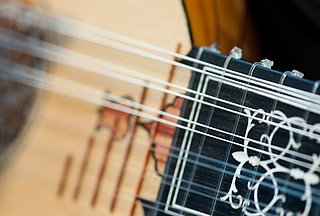Bachelor of Music -
Mandolin
A unique course of study.
The mandolin course at the Cologne University of Music and Dance in Wuppertal has been the top address for the artistic and pedagogical study of the instrument for three decades. It is also currently home to the only professorship in Germany for the mandolin as a major artistic subject. Mandolin training has been setting standards in the professionalization of students for decades and is regarded as a center of excellence in the international mandolin world. Artistic skills, didactic and musicological expertise are taught to students by top-class lecturers in an interdisciplinary manner and lead to a comprehensive education. The artistic training in the main subject mandolin can be extended by studying the soprano lute / baroque mandolin and offers extensive opportunities for artistic realization in the combination of both instruments. Lessons in the main subject are supplemented by weekly auditions and chamber music sessions. Numerous concert appearances within and outside the university as well as the opportunity to take part in competitions complement the artistic training and offer the chance to gain a wide range of artistic experience. The possibility of accompaniment with guitar/lute supports the development of new works and their performance.
If you have any questions about the course, please get in touch with the responsible contact person(s).
Basic information
| Degree | Bachelor of Music |
|---|---|
| Period of study | 8 Semester |
| Course begin | Wintersemester |
| ECTS points | 240 Credits |
| Major subjects | Mandoline |
| Continuing study options | Concert exam, Master of Music Mandolin |

Special features of the study
A highlight of the training is the participation in the ensemble Cappella dei Leutini. This unique ensemble, which performs on historical instruments of the lute family, brings the diverse music of the Renaissance and Baroque periods back to life in a particularly striking way. Students, graduates and lecturers of the Cologne University of Music and Dance, Wuppertal location, make music together on soprano lutes, tenor lute, baroque guitar, vihuela and viola da gamba. Didactic skills are taught in a practical way. Cooperation with music schools, for example in the form of internships, as well as work in the amateur sector through participation in seminars and workshops, and collaboration with plucked string orchestras create fields of activity that underpin the education and create early links to later professional life.
Musicological know-how broadens access to the instrument, which in many respects is still unexplored. The teaching of procedures that facilitate access to unknown literature and sources or the use of new media is also a significant part of the training. The high educational standards at the university ensure that the traditional as well as current requirements of the various artistic and instrumental pedagogical professions are met in a practice-oriented manner within the framework of the Bachelor's and Master's system.
Application and aptitude test
Applications are submitted online via the muvac platform. All information on the procedure can be found on our application page.
Admission requirements
- General university entrance qualification or a comparable university entrance qualification
- Proof of a TestDaF 3 language certificate for non-German-speaking applicants
- Successfully passed aptitude test
Qualifying examination
The aptitude test takes place in two parts.
- Artistic-practical examination in the main subject (approx. 20 minutes)
- Music theory (approx. 90 minutes)
Detailed information can be found in the aptitude test regulations, especially in the appendix for content requirements and conduct of the test.
Course of studies and examination regulations
The program is divided into a basic study period (1st and 2nd year) with a high proportion of compulsory modules and a differentiated main study period (3rd and 4th year). The structural framework is formed by 6 main modules and the profile-forming module 8:
- Core module
- artistic-practical context
- Education
- Mediation
- professionalization
- Bachelor thesis / interdisciplinary project
- Profiling solo/chamber music or instrumental pedagogy
After the two-year basic studies, the following profiles are possible in the following main studies (also 2 years) with the mandolin as the artistic main subject.
- Instrument solo/chamber music
- Instrumental Pedagogy
Teachers
Fachdidaktik Mandoline
Korrepetition Mandoline
Mandoline
Current events
Konzertsaal Wuppertal Wuppertal


Contact
|
caterina.lichtenberg@hfmt-koeln.de |
|
| Address |
Hochschule für Musik und Tanz Köln Sedanstraße 15 42275 Wuppertal |
